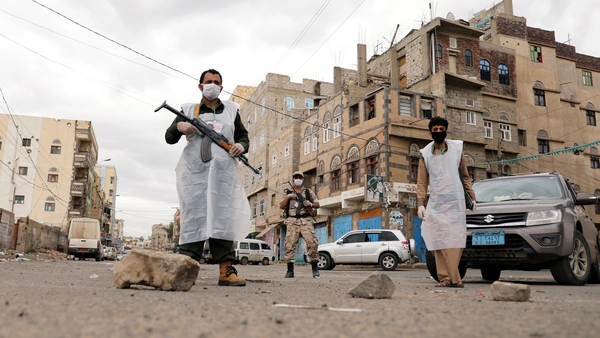
Security men wearing protective masks stand on a street during a twenty-four hour curfew that was instituted over concerns about the spread of the novel coronavirus in Sanaa, Yemen, on May 6, 2020. Khaled Abdullah/Reuters
The Center for Preventive Action has created this resource for those seeking information and analysis about the effects of COVID-19 on peace and conflict
Last updated May 15, 2020
Overview
How will the novel coronavirus pandemic affect the risk of violent conflict and prospects for peace around the world? There is no clear, easy answer—the crisis is still unfolding in surprising ways and assessments about its ramifications shift daily. To complicate matters, the impact of the virus has varied between different regions and conflict zones, making it difficult to render broad judgments about its consequences. Also, what may be relevant for gauging how the coronavirus could increase the risk of an armed confrontation between the major powers will almost certainly be different to assessing how civil unrest could worsen in vulnerable fragile states. The same uncertainty also surrounds current and prospective efforts to manage violent conflict. For every news report of a cease-fire or breakthrough in peace talks there is a corresponding story that details a deteriorating situation. And just as progress in one area can help advance the cause of peace in another, so the reverse is often true.
In keeping with its mission to help the general public understand conflict-related issues that affect the United States, as well as contribute to informed policy debate about the best ways to address them, the Center for Preventive Action (CPA) has created this page as a resource for information and analysis about the effects of COVID-19 on peace and conflict. The issues covered below are organized into relatively discrete categories that seek to address U.S. conflict priorities, but are by no means exhaustive—nor are the articles listed representative of all available information and analysis on these topics. This page will be updated weekly.
To explore more background and analysis about the effects of COVID-19 on specific country and regional conflicts, visit CPA’s Global Conflict Tracker.
World Order
Stephen M. Walt, «Will a Global Depression Trigger Another World War?» Foreign Policy, May 13, 2020.
Stewart M. Patrick, “The World Order After COVID-19 Hinges on What Kind of America Emerges,” World Politics Review, May 11, 2020.
Edward Fishman, «The World Order Is Dead. Here’s How to Build a New One for a Post-Coronavirus Era,» Politico Magazine, May 3, 2020.
Joseph Nye, Jr., «No, the Coronavirus Will Not Change the Global Order,» Foreign Policy, April 16, 2020
Philip H. Gordon and Jeremy Shapiro, “The Atlantic Alliance Had Preexisting Conditions. The Pandemic Will Worsen Them,” War on the Rocks, April 13, 2020.
Colin H. Kahl and Ariana Berengaut, “Aftershocks: The Coronavirus Pandemic and the New World Disorder,” War on the Rocks, April 10, 2020.
Nathalie Tocci, “How Coronavirus Will Upturn the Global Order,” Politico, April 9, 2020.
Richard N. Haass, «The Pandemic Will Accelerate History Rather Than Reshape It,» Foreign Affairs, April 7, 2020.
Henry Kissinger, «The Coronavirus Pandemic Will Forever Alter the World Order,» Wall Street Journal, April 3, 2020.
Judah Grunstein, «Why the Coronavirus Pandemic Won’t Lead to a New World Order,» World Politics Review, April 1, 2020.
Mieke Eoyang, Ilan Goldenberg, and Thanassis Cambanis, “A New World Order After the Pandemic?”, TCF World Podcast (podcast), March 23, 2020.
John Allen, et. al, «How the World Will Look After the Coronavirus Pandemic» Foreign Policy, March 20, 2020.
Kurt Campbell and Rush Doshi, «The Coronavirus Could Reshape Global Order,» Foreign Affairs, March 18, 2020.
Related
